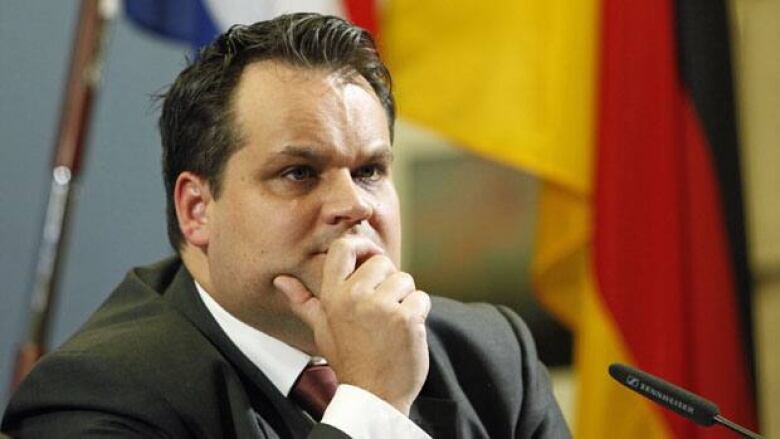Greek debt deal could be forced on lenders

The Dutch finance minister warned Monday that private creditors may be forced to take losses on their lending to Greece if they cant negotiate a voluntary deal on easing the Greek debt burden.
"We've never said it [the debt restructuring] must be voluntary." Our goal is a sustainable debt," Jan Kees de Jager said. "It has our preference if it's voluntary, but it's not a precondition for us."
De Jager is the first of the 17 eurozone finance ministers to openly raise the prospect of forcing private creditors to accept terms.
His comments came as negotiations between representatives of the creditors and the Greek government were due to continue and as European finance ministers met in Brussels.
The aim is to cut the size of the debt so it can avoid default. One proposal would have the private creditors, which include banks and other investors, swap their bonds for new ones at a 50 per cent discount, reducing the country's debts by100 billion ($131 billion).
The new bonds will have much longer maturities, pushing repayments decades into the future, and a much lower interest rate than Greece would currently have to pay on the market.
New rate an obstacle
The talks have hit an impasse over disagreements about the interest rate on new, lower-valued bonds.
Negotiations had been due to resume Saturday, after three days of intensive talks, but Charles Dallara, the chief negotiator for the private lenders, left for a "long-standing engagement" in Paris on Saturday.
The creditors' legal and financial advisers are still in Athens working on several "outstanding issues" and Dallara will return "as needed," a spokesman said. Greek government spokesman Pantelis Kapsis said there was "absolutely no" question of the talks failing.
On Sunday, Dallara was quoted by private Antenna TV as saying he had presented Athens with "the best possible" proposal on the debt writedown. "I believe the elements now are in place for a historic voluntarydeal. It is a question now really of the broader reaction of the European official sector and of course the [International Monetary Fund] to this proposal," he said.
Having a deal voluntarily accepted by creditors would avoid the payout of insurance on the restructured bonds. A disorderly defaultmight create a financialcrisis of its own, if banks become reluctant to lend to each other out of concern about how much and which banks are on the hook for the insurance payouts.
The European Union and IMF are trying hard to keep it a voluntary deal, but Dallara suggested their demands were pushing the limits of what the private creditors could consider voluntary.
"Our offer that was delivered to the prime minister is the maximum offer consistent with a voluntary PSI [private sector involvement] deal," he added. "We are in a crossroads. Either we choose a voluntary debt restructuring [or] the alternative is to choose the path of default."

Dallara said he was hopeful that common ground can be reached "in the very, very, very short term." The talks will likely drag on until a summit of European Union leaders next Monday, "even if technically speaking a deal is at hand," a European diplomat said Monday.
"This has to be fixed at the highest level," said the diplomat, who was speaking on condition of anonymity because the negotiations are confidential.
French finance chief Franois Baroin said a deal "seems to be emerging."
Greek Finance Minister Evangelos Venizelos described negotiations as "very co-operative."
"We are ready to finalize the procedure on time," he said, without specifying when.
The Greek government says it is continuing negotiations over the phone, though no appointment has been set yet for new face-to-face talks this week. Investors appeared confident that a deal would be struck eventually, and pushed the euro higher.
It was trading up 0.85 per cent, at $1.30 US late in the morning.
Without a deal, Greece is widely expected to default on March 20, when it faces a bond redemption that it currently cannot meet without a break on its terms.
Greece needs to secure a deal quickly if it wants to avoid a disorderly default by then.
"Given that any debt swap deal will involve a lot of lawyers, it is estimated that around five weeks are needed between agreement and the bond maturing to prevent default," said Louise Cooper, markets analyst at BGC Partners.
"This does not leave much wriggle room, although such pressure must focus the minds of all at the negotiating table."
The debt writedown is a key condition of Greece's second international bailout, agreed to in October but not yet finalized. Since May 2010, the country has been surviving on a first110-billion ($144 billion) batch of rescue loans agreed on condition of deep spending cuts and sweeping public sector reforms.
With files from The Associated Press












_(720p).jpg)


 OFFICIAL HD MUSIC VIDEO.jpg)
.jpg)



























































































